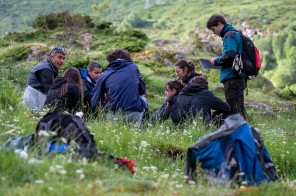Studying biodiversity in the heart of the Pyrenees: European students immersed at UPPA
This Blended Intensive Programme (BIP), co-constructed by teachers from these establishments, aimed to train undergraduate, masters and doctoral students in the methods of studying and analysing biodiversity. For this first edition, the Pyrenees served as a life-size learning ground, combining species observation, sample collection and interdisciplinary exchanges.
Back in Pau, the samples collected are analysed in the UPPA laboratories. This second phase enables students to compare their field observations with the tools of scientific research: soil and water analyses, identification of plant and animal species under magnifying glasses and microscopes, interpretation of acoustic recordings, analysis of environmental DNA, etc. This is a fundamental part of acquiring a comprehensive approach to the study of biodiversity.
Supervised by specialists - botanists, ornithologists, herpetologists, soil scientists, entomologists, zootechnicians - the students have developed practical skills for understanding and analysing the complexity of ecosystems.
Gipsy Peltier, a biology teacher at UPPA and head of the project, emphasises the high scientific level of the participants and the richness of the exchanges between universities.
Next year, the University of Turin will host the second edition of this BIP, confirming the European training dynamic supported by the UNITA alliance, which brings together twelve universities across Europe.
_141x319.png)











